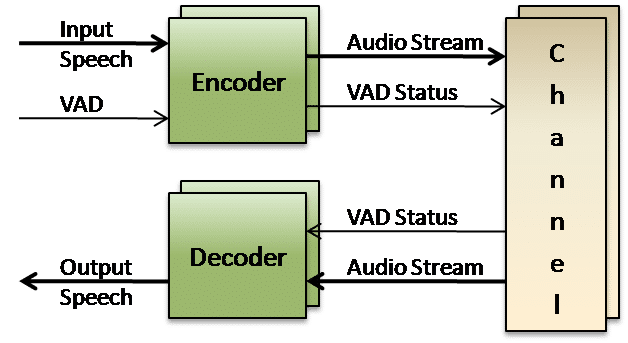
G.729A codec
- Reduced complexity wideband audio codec
- Mobile, VoIP and Voice Conferencing
- Real-time multi-channel implementation
- Optimized for DSPs, RiSC, CISC processors
- ITU-T G.729 Annex A compliant
G.729A codec is used as an internet wideband audio codec for VoIP or similar applications. Contact us to discuss your G.729A vocoder application requirements.
VOCAL’s G.729A codec source code is optimized for performance on leading DSPs and conventional processors from TI, ADI, ARM, Intel and other vendors. It is available as a standalone voice compression algorithm, as part of a modular software library suite, as well as with a VoIP stack. Custom designs are also available to meet your specific requirements.
G.729A
G.729A is a reduced complexity Conjugate-Structure Algebraic-Code-Excited Linear Prediction (CS-ACELP) speech compression algorithm defined in ITU-T G.729 Annex A. G.729A is interoperable with the G.729 codec. The reduction in complexity may result in a small decrease in voice quality. G.729A may be used as an internet wideband audio codec for VoIP or similar applications using multimedia, voice, and/or data although the G.729AB codec may be better in reducing bandwidth usage.
G.729A requires 10 ms input frames and generates frames of 80 bits in length. Since G.729A is based on the Code-Excited Linear Prediction (CELP) model, each 80 bit frame produced contains linear prediction coefficients, excitation code book indices, and gain parameters that are used by the decoder in order to reproduce speech. The inputs/outputs of G.729A are 16 bit linear PCM samples that are converted from/to an 8 kbps compressed data stream. G.729A has the same total algorithmic delay of 15 ms as the G.729 speech coder.
The majority of the changes made to reduce complexity were in the G.729A encoder. The perceptual weighting filter uses instead the Linear Prediction Filter Co-efficients, making computation of the weighted synthesis filtering much easier. Decimation is used in the open-loop pitch analysis to compute correlations with weighted speech. Searches of both the adaptive and fixed algebraic codebooks were simplified as well. In the G.729A decoder, some modifications were made in the adaptive postfilter.
Features
- Compliant with G.729, Annex A, Annex B specifications
- Full and half duplex modes of operation
- Passes ITU test vectors
- Optimized for high performance on leading edge DSP architectures
- Multichannel implementation
- Multi-tasking environment compatible
Configurations
- DAA interface using linear codec at 8.0 kHz sample rate
- Direct interface to 8.0 kHz PCM data stream (A-law or μ-law)
- North American/International Telephony (including caller ID) support available
- Simultaneous DTMF detector operation available – (less than 150 hits on Bellcore test tape typical)
- MF tone detectors, general purpose programmable tone detectors/generators available
- Data/Facsimile/Voice Distinction available
- Common compressed speech frame stream interface to support systems with multiple speech coders
- Dynamic speech coders selection if multiple speech codecs available
- Can be integrated with Acoustic Echo Canceller, G.168 Line Echo Canceller and Tone Detection/Regeneration modules
- Multiple ports can be executed on a single DSP
- Can be integrated with VoIP stack
Platforms
![]()
VOCAL’s vocoder software is available for the following Platforms. Please contact us for specific G.729A supported platforms.
| Processors | Operating Systems |
|---|---|
|
|
More Information
- Audio Examples
- MIPS/memory requirements
- PSQM/PSQM+ values
- ITU Recommendation G.729
- RFC 3551 – RTP Packetization
- RTP Parameters